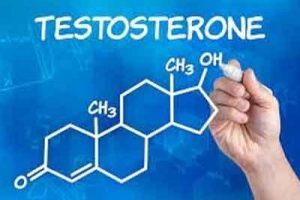- Home
- Editorial
- News
- Practice Guidelines
- Anesthesiology Guidelines
- Cancer Guidelines
- Cardiac Sciences Guidelines
- Critical Care Guidelines
- Dentistry Guidelines
- Dermatology Guidelines
- Diabetes and Endo Guidelines
- Diagnostics Guidelines
- ENT Guidelines
- Featured Practice Guidelines
- Gastroenterology Guidelines
- Geriatrics Guidelines
- Medicine Guidelines
- Nephrology Guidelines
- Neurosciences Guidelines
- Obs and Gynae Guidelines
- Ophthalmology Guidelines
- Orthopaedics Guidelines
- Paediatrics Guidelines
- Psychiatry Guidelines
- Pulmonology Guidelines
- Radiology Guidelines
- Surgery Guidelines
- Urology Guidelines
Men's testosterone levels largely determined by environment not genetics

The childhood environment plays an important role in determining the level of testosterone in man rather than genetically, suggests a Durham University-led study recently published in the journal Nature Ecology and Evolution.
The study emphasizes that men who grow up in more obnoxious conditions where there are enough chances of infectious diseases, for example, are likely to have lower testosterone levels in later life than those who spend their childhood in healthier environments.
A man's childhood environment should be considered on priority when diagnosing for prostate enlargement and cancer as these diseases are triggered by high levels of testosterone.
Aspects of male reproductive function remain changeable into adolescence, up to the age of 19 and are more flexible in early rather than late childhood, according to the research. However, the study suggests that, in adulthood, men's testosterone levels are no longer heavily influenced by their surroundings.
The study involved 359 male participants from Bangladesh who provided health data including their height, weight, the age of puberty, and other relevant details. Saliva samples were also taken to examine their testosterone levels.
The participants were divided into a number groups for comparison, including men who were born in and still live in Bangladesh, Bangladeshi men who moved to the U.K. as children, Bangladeshi men who moved to the U.K. as adults, etc.
The study found that Bangladeshi men who grew up and lived as adults in the UK had significantly higher levels of testosterones compared to relatively well-off men who grew up and lived in Bangladesh as adults. Bangladeshis in Britain also reached puberty at a younger age and were taller than men who lived in Bangladesh throughout their childhood.
The findings of the study have really challenged the theory that testosterone levels are controlled by genetics or race.
Explaining the cause of such phenomenon, the researchers suggest that the differences are linked to energy investment as it may only be possible to have high testosterone levels if there are not many other demands placed on the body such as fighting off infections. In environments where people are more exposed to the disease or poor nutrition, developing males direct energy towards survival at the cost of testosterone.
"A man's absolute levels of testosterone are unlikely to relate to their ethnicity or where they live as adults but instead reflect their surroundings when they were children," said Dr. Kesson Magid, the lead author of the study.
Very high and very low testosterone levels can have implications for men's health and it could be important to know more about men's childhood circumstances to build a fuller picture of their risk factors for certain conditions or diseases." said the co-author Professor Gillian Bentley.
Very high levels of testosterone lead to increased muscle mass, increased risk of prostate diseases and higher aggression. Very low testosterone levels in men lead to lack of energy, loss of libido and erectile dysfunction. However, the testosterone levels of the men in the study were found to be in a range that would unlikely have an impact on their fertility.
For more reference log on to https://www.nature.com/articles/s41559-018-0567-6

Disclaimer: This site is primarily intended for healthcare professionals. Any content/information on this website does not replace the advice of medical and/or health professionals and should not be construed as medical/diagnostic advice/endorsement or prescription. Use of this site is subject to our terms of use, privacy policy, advertisement policy. © 2020 Minerva Medical Treatment Pvt Ltd